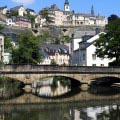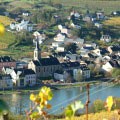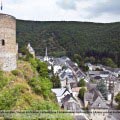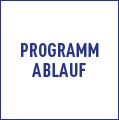




The Region
Whoever thinks of Luxemburg, thinks of the well-known court of the Grand Duke, of the relaxed radio and television programme of Radio Luxemburg (RTL) or of the German prom’s tax heaven. Less well-known is the beautiful scenery of this small state in the middle of Europe. Luxemburg shares three natural areas: in the largely virgin north lie the idyllic river valleys of the Ösling, with its lush forests stretching to the northwest as far as the Belgian Ardennes. Farther to the south, Luxemburg’s most important wine-growing area extends along the Moselle: the local vines, especially the dry Riesling, are being praised by specialists. Luxemburg’s central and southern areas, fertile with the Alzette flowing through, is named Gutland.
Read More / Weiter Lesen »
Culture & Sights
Luxemburg’s identity lies in its role of European mainland. The smallest member state of the European Union is home to important European institutions. Here is the seat of the European Court of Justice as well as of the European Monetary Fund. Luxemburg’s European commitment is the result of its bitter past. Throughout its history Luxemburg was regularly invaded by hostile armies. The origin of Luxemburg goes back to the tenth century: a noble family from the Moselle region earned the “Gutland” on the course of the Alzette and had the Lützelburg erected in 963, the castle which gave the name to the dynasty. In Luxemburg a variety of historical and cultural sights wait to be discovered by you. Picturesque squares, homely old-city lanes, splendid boulevards and spacious parks invite for a stroll. Besides the capital, the abbey Echternach and the knight’s castle near Vianden are also well worth seeing.
Cuisine
Popular dishes typical for the region are Judd mat Gaardebounen, smoked pork with kidney beans as well as Bouneschlupp, bean soup with potatoes. Deliciuos desserts are, for example, Quetschentaart and Omelette soufflée au kirsch. Regional specialities are Ardennes ham, jellied pork, Riesling pastry, crab and pike as well as fried fish from the Moselle and the Untersauer.
The Country and its People
On the oriel of a merchant’s house in the old centre of Luxemburg one can read an aphorism, reflecting the mind’s essence of the citizens of this small duchy: “Mir wolle bleibe wat mir sin” (We want to remain what we are”). This creed, written in the language of Luxemburg, is an expression of the century-old will of the people of Luxemburg to stand their ground between their strong neigbours Germany and France.






